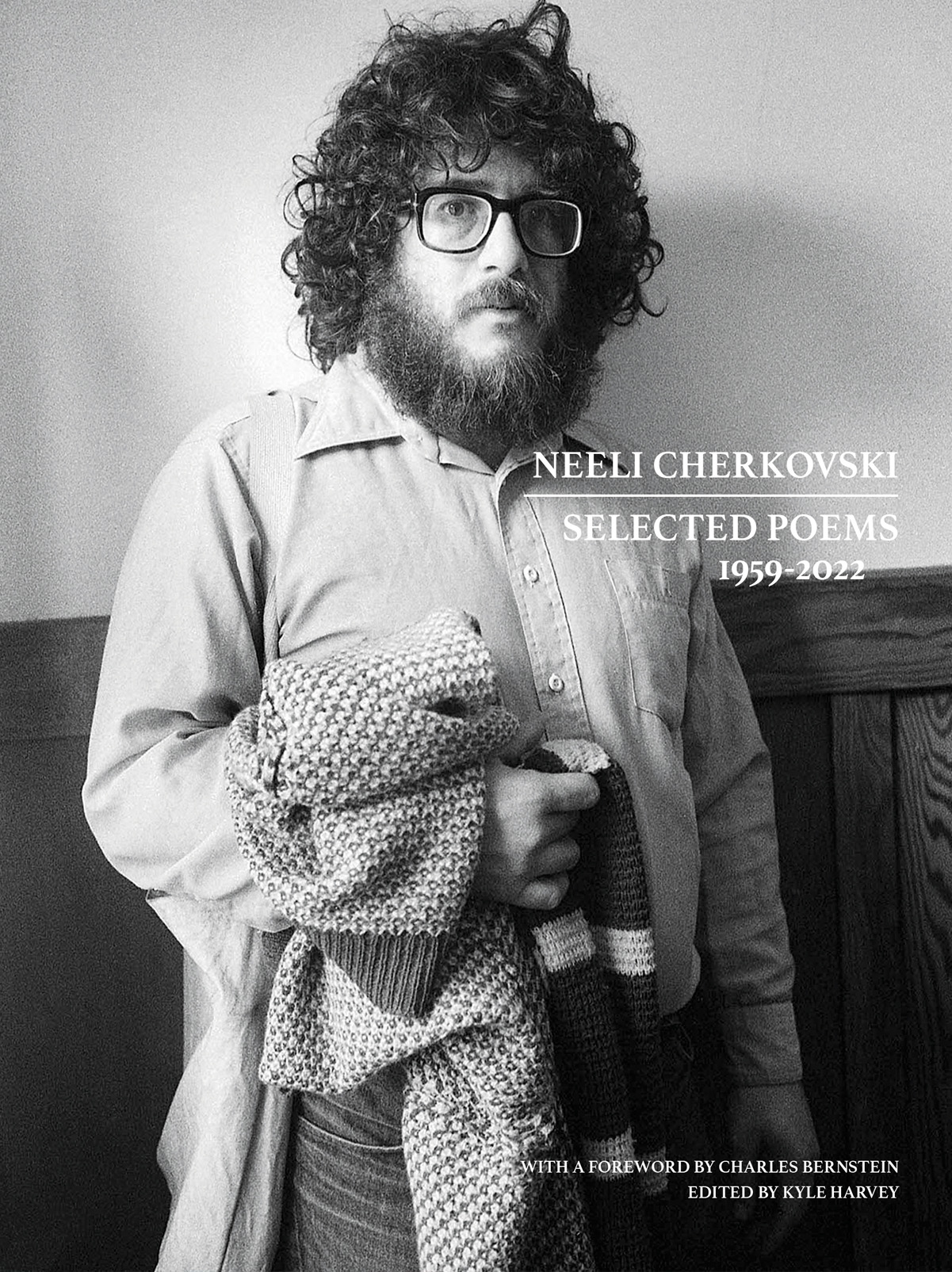Neeli Cherkovski
Lithic Press ($28)

by Zack Kopp
A writer of poems that fill one up like nourishing and enjoyable word-meals, Neeli Cherkovski (born in 1945) continued creating his artfully imaginative verse right until the end of his life on March 19, 2024. The posthumous publication of Cherkovski’s Selected Poems: 1959-2022 represents his long overdue recognition as one of the most essential poets of the Beat Generation. In addition to the searching, haunted poems in this beautifully printed 400-page book, an introduction by Charles Bernstein situates how their author consistently “bows head in respect to disrespect”; while photographs track a life of literary engagement, starting with a picture taken with Lawrence Ferlinghetti around the time Cherkovski’s Ferlinghetti: A Biography (Doubleday, 1979) was published, and one of an even younger version of Cherkovski sitting on a tricycle next to his friend and mentor Charles Bukowski (also on a tricycle).
Perhaps due to having caroused with Bukowski in Los Angeles during the 1960s—adventures recounted not only by Bukowski in poems, stories, and articles (where he commented more than once that Cherkovski would “make a great rabbi someday,” popularizing and belittling him in one swipe) but also in Cherkovski’s landmark biography Hank: The Life of Charles Bukowski (Random House, 1991)—Cherkovski’s work has often been perceived in the shadow of Bukowski’s, so proper estimation of his own poetic voice has been delayed. The pair shared a winsome dynamic, as can be seen in an early poem in Selected Poems, “THIS ONE BUKOWSKI THREW INTO THE FIREPLACE (WITHOUT READING)”:
Bukowski looks out of his window
he looks out of his Hollywood window
his forty-year window
his Hollywood Park window
Bukowski looks down from his three story window
he can see little children playing below
and he cries because someday they will die
when the fallout crosses the street they will die
and if not the bomb then age or sickness
or some holy accident
he opens the window to let in the air
But beyond Cherkovski’s teen years, the differences between the writers became more pronounced than their similarities. In contrast to Bukowski’s habitually spare voice, Cherkovski writes poetry as if to give the very letters on the page back their lives by turning them into trees again—albeit in a whole other spirit. Take “Leaves,” from 1979:
ONCE THE UNBREAKABLE LEAVES SPOKE A LANGUAGE
THAT FLOWED LIKE PURE CLEAR WATER FROM THE
BREATHLESS LAND ONTO PROSPEROUS FIELDS & SEA-
LINES STRETCHED TO ISLANDS WHERE TALL SWAYING
PALMS BECAME THATCH-ROOFED HOUSES FOR PEOPLE
WHO BELIEVED IN MANY GODS AND IN TONGUES OF
FIRE THAT CALLED FROM DEEP IN THE RESTLESS
OCEAN & THEY KNEW THE NAMES, LONG OBSCURED,
OF PALM GOD AND GRASS GOD AND GOD IN SAND
AND WATER & THE LEAVES FALL LIKE IRON PLATING
ONTO THE AWAKENING PLAIN & DAWN, INDEFINABLE
BEAST, CRAWLS UP THE COASTAL HILLS AND DOWN
TO THE SHORE & ONCE THE CANYON LEAVES DID
NOT REST LIKE TABLETS, ONE RED, ONE YELLOW,
HOLDING WORDS OF A WISDOM MORE SENTIENT, LESS
BELLICOSE, FILLED WITH GREATER UNDERSTANDING
& THOSE WHO PRESSED THEM INTO BOUND VOLUMES
RESTORED OLD ENERGIES TO THE SUN AND PASSED ON
Always seeing more books in the trees, the ocean full of individual drops of liquid, and mercy going in and out of print as time proceeds, Cherkovski offers readers the flash of living language; there is a primordial omniscience in his work, as if the sudden brightness of dinosaur-brained birds is lighting up the pitch-black darkness.
Let’s therefore remember this wizened Bohemian bard who so passionately wrote from his neighborhood of living letters “near San Francisco but not San Francisco but part of San Francisco, frozen in time somewhere in the sixties or maybe the sixty-eight-seventies,” as he once described it in a Facebook post. Besides being a gifted inimitable West Coast poet and a pioneering proselytizer for the writers he dubbed “Whitman’s Wild Children,” he was a lovely person who invited all who met him into the warm embrace of lyric poetry. Let’s remember him, in fact, by heeding the instructions offered in one of the last poems in this volume, “Don’t Forget Me”:
when I am gone
think of me
as you tinker in
the technological forest
find time to draw
my words on your cloud
think of me as
a strip of bark
on an ash tree
as you lead the bees
on a country path
. . . . . . . . . . . . . . . . . . . . .
learn my odes by heart
remember the timbre
of my voice,
don’t forget me,
I was a poet
come listen
when my spirit rises
on branches
of the last redwood tree
wipe my tears
tell me I’m remembered
lie if you must
Rain Taxi Online Edition Summer 2024 | © Rain Taxi, Inc. 2024
